

Untitled. Untitled. Help! My Teenage child has changed! The Teenage Brain Explained. The Growing Child: Adolescent 13 to 18 Years. How much will my adolescent grow?
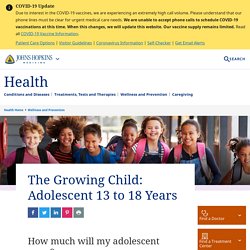
The teenage years are also called adolescence. Adolescence is a time for growth spurts and puberty changes. An adolescent may grow several inches in several months followed by a period of very slow growth, then have another growth spurt. Changes with puberty (sexual maturation) may happen gradually or several signs may become visible at the same time. There is a great amount of variation in the rate of changes that may happen. What changes will happen during puberty? Sexual and other physical maturation that happens during puberty is a result of hormonal changes.
Beginning of puberty: 9.5 to 14 years old First pubertal change: enlargement of the testicles Penis enlargement: begins approximately 1 year after the testicles begin enlarging Appearance of pubic hair: 13.5 years old Nocturnal emissions (or "wet dreams"): 14 years old Hair under the arms and on the face, voice change, and acne: 15 years old.
Adolescence: Crash Course Psychology #20. How to parent a teen from a teen’s perspective. What is a Stimulus? Positive? Negative? Untitled. Untitled. Summary: Reinforcement and Punishment. Positive Reinforcement - The Big Bang Theory. Positive Reinforcement. BYU Study: a need for positive reinforcement among teens. There are countless publications describing the best ways to raise a child in the hopes of them becoming successful adults.

Between the books, magazines and video tutorials, parents may be finding themselves overwhelmed on more than one occasion. But a group of researchers at Brigham Young University have found the answer to helping children through life may be less complicated than it seems. The BYU study found bad behavior can be discouraged among children by simply encouraging good behavior. The study, Flourishing During the Teen Years: Why “Not Being Bad” Isn’t Good Enough, used information from a 10-year project that followed 500 families in order to see where the individuals struggled and what actions helped them become successful.
When the study began, the children in the families were 11 years old. “For this brief we didn’t look at how these effects changed over time,” wrote Laura Walker, BYU professor and lead researcher of the study. Popular stories. Benefits of Positive Reinforcement for Teens. Positive Reinforcement - Tips for teaching and parenting. Negative Reinforcement. Negative Reinforcement. Using Reinforcement effectively. Learning: Schedules of Reinforcement. Positive Punishment. Untitled. Using positive punishment effectively. Positive Punishment: What It Is, Benefits, and Examples. Positive punishment is a form of behavior modification.
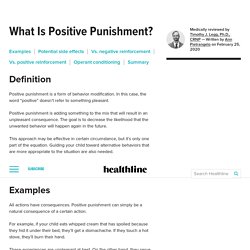
In this case, the word “positive” doesn’t refer to something pleasant. Positive punishment is adding something to the mix that will result in an unpleasant consequence. The goal is to decrease the likelihood that the unwanted behavior will happen again in the future. This approach may be effective in certain circumstance, but it’s only one part of the equation. Guiding your child toward alternative behaviors that are more appropriate to the situation are also needed.
Negative Punishment. Using Negative Punishment effectively. Positive And Negative Reinforcement vs Positive and Negative Punishment. Reinforcement and punishment are often used as parenting tools to modify children’s behavior.
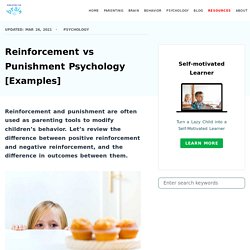
Let’s review the difference between positive reinforcement and negative reinforcement, and the difference in outcomes between them. The Difference Between Positive And Negative Reinforcement In behavioral psychology, reinforcement is the introduction of a favorable condition that will make the desired behavior more likely to happen, continue or strengthen in the future1. Because the favorable condition acts as a reward, reinforcement is a reward-based operant conditioning. Which Is Better, Rewards or Punishments? Neither. “I feel a sense of dread as bedtime rolls around. Here we go again.” A dad said this in our family therapy office one day, describing his son’s pre-bed antics.
The child would go wild as bedtime approached, stubbornly ignoring his parents’ directions and melting down at the mention of pajamas. The parents felt frustrated and stumped. Using Punishment & Reinforcement. Communication and the Teenage Brain. Be a better parent by partnering with your teen. Be there for your child, listen and never shout. Building Good Relationships and Rapport with your Teens. One of the biggest struggles between parents and their teenage children is their ability to relate to one another.

It can be difficult for the two parties to develop positive working relationships, simply due to the nature of teenage development and the process of parenting. However, parents can take the lead and make strides to develop a good relationship and strong, positive rapport with their teens, if they are willing to put in the work. Negative forms of communication erode relationships. If you want to develop a good relationship with your teen, the first thing that you must do is try to eliminate negative communication from your relationship.
Negative communication includes things such as yelling, nagging, lecturing, threats, and arguing. 10 Tips for Improving Parent-Teen Relationships. You know your child is an adolescent (semi-formed human) when she or he: Gives you attitude over stuff that's never been an issue before.

Refuses to do what you ask. Agrees to do it and then (un)wittingly "forgets" Denies they ever agreed to anything. Is my teen struggling with mental health? A Guide to Teen Mental Disorders. Reading Time: 6 minutes Today, one in five teens has a diagnosable mental health disorder, such as depression or anxiety.
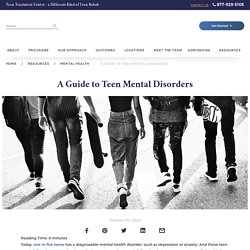
And these teen mental disorders are on the rise. In fact, experts say that mental disorders in teenagers are at an all-time high. In addition to depression and anxiety, teenage mental health issues include trauma, Borderline Personality Disorder, and schizophrenia. Furthermore, teenage behavior disorders, such as substance abuse and eating disorders, are also classified as psychological disorders in teens. Identifying teenage mental illness symptoms can be difficult. Below is a look at the various teenage mental disorders. Major Depression in Teens One of the most common mental disorders among young adults in the United States is depression. Teenage Depression: Signs, Causes and Treatment. Learn about the warning signs of depression in teenagers, and its causes and treatments from the Department of Psychiatry at Singapore General Hospital (SGH).
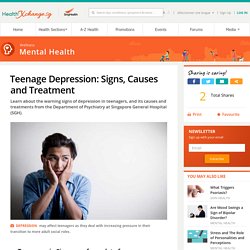
Teenagers in Singapore face a lot of pressure, which can potentially lead to depression. Not unlike adults, teenagers in Singapore are under a lot of pressure. Going through the hormonal changes of puberty, they need to deal with peer group influences, major exams and transition to more adult social roles. Parents need to be aware that these demands can be overwhelming and precipitate depression in teenagers. “Referral rates for psychiatric help in young persons with depression seem to be increasing over the years,” says Associate Professor Leslie Lim, Senior Consultant, Department of Psychiatry, Singapore General Hospital (SGH), a member of the SingHealth group.
Eating Disorders. Eating disorders are illnesses that manifest themselves in extreme unhealthy eating patterns. They are mental conditions that affect eating habits but are not necessarily tied to a specific body type; someone with an eating disorder can appear very thin, healthy weighted or above healthy weight. Although symptoms of these disorders emerge primarily in young women, eating disorders can affect anyone from any gender, age, ethnicity and income level. There are a few main types of eating disorders, highlighted below.
An individual with an eating disorder can suffer from more than one of the following types of disorders. The following describes the symptoms and not the causes of eating disorders. Anorexia Nervosa involves the partial or total abstinence from food (solids or liquids) because she/he believes any amount of food will cause weight gain. Anxiety in teens: what it is & how to help. What is anxiety?
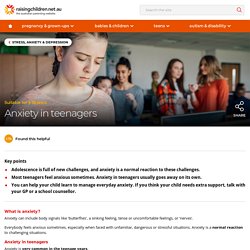
Anxiety can include body signals like ‘butterflies’, a sinking feeling, tense or uncomfortable feelings, or ‘nerves’. Everybody feels anxious sometimes, especially when faced with unfamiliar, dangerous or stressful situations. Anxiety is a normal reaction to challenging situations.